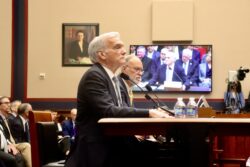Americans need to be more in touch with their institutions, said Njoki Njoroge Njehu who spoke Tuesday night. A strong advocate for social and economic justice, she said she feels that the people in the United States need to become more aware of international struggles and the community at large.
The goal of her organization, 50 Years is Enough: U.S. Network for Global Economic Justice, is to “raise the profile and remind people in the United States and other parts of the global world that lots of practices are done in our name and with our tax money,” Njehu said.
The mission of the World Bank, founded in 1944 in Bretton Woods, N.H., she said, was to “alleviate poverty.”” Originally created with the intent to aid and reconstruct Europe after World War II, it worked in conjuction with the Marshall Plan to provide much-needed capital. The role of the International Monetary Fund, also created under the the Bretton Woods system, was to monitor the economies of the United States and foreign countries.
Though Njehu said that every two years the World Bank rededicates itself to reducing poverty, such rededication does not counter the inevitable changes within the institution.
She distinguishes between the grants that were given post-War II and the loans today that have placed some countries, such as Nigeria and Haiti, into greater debt.
Njehu cited the example of Nigeria to illustrate this point. Nigeria borrowed $5 billion dollars from the World Bank in 1978. Despite the fact that it had already repaid $16 billion, the country still owes $31 billion because of increasing interest rates.
“You have to wonder,” she said, “about an economic system that creates debt. A country borrows some and owes a lot more.”
According to Njehu, the World Bank uses the debt to exert control over the policies of these nations, opening them up to the exploitation of labor and natural resources. The establishment of free trade zones is one such exploitative measure. Within these zones, labor is deprived of minimum wage standards and the right to organize.
Asked whether corruption is the reason for the ineffectiveness of debt relief initiatives, Njehu responded “There is corruption but it is not a psychological condition.”
Rather than “judging harshly” corruption in developing countries, Njehu said she feels that money needs to be monitored more closely so that the money for aid is used to help the people of poor countries and not to enrich heads of state.
Though she said that the World Bank and IMF need to take more of a responsibility in management and monitioring loans, she said she advocates a more independent role for developing nations within the debt relief system.
“Countries,” she said, “cannot figure out their own destiny or path of development.” Rather than imposing structural adjustment programs upon them, countries should be allowed to have more freedom in developing their national policies.
Njehu said the IMF and World Bank efforts to reduce poverty are necessary but their approach is flawed. There needs to be more accountability. In light of recent protests in Seattle and Genoa, she sees Americans as holding themselves more accountable in the global economic arena and becoming more conscious of the effects to allevaite the financial difficulties of developing countries.



